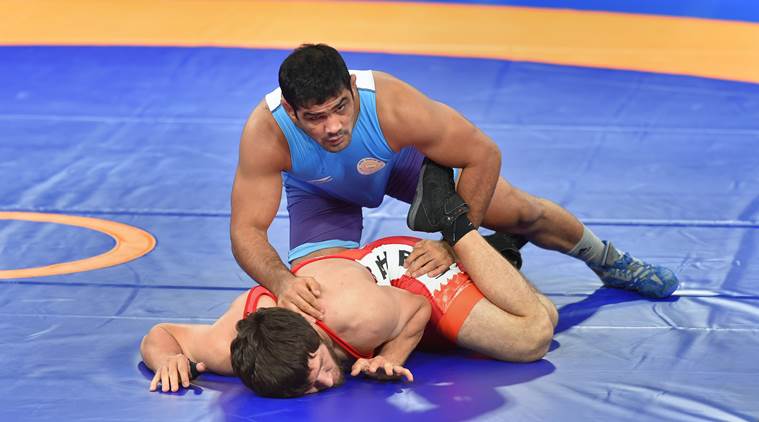 Sushil Kumar lost in first round of his 74kg category. (PTI Photo)
Sushil Kumar lost in first round of his 74kg category. (PTI Photo)
When Sushil Kumar says wins and losses are integral of sport, he forgets that Indians haven’t really witnessed his defeats often enough to consider this win-loss business a routine part of his 10-year-long career in the spotlight. It’s not that Sushil has stayed unbeaten since Beijing in 2008, though the silver and bronze Olympic medals make him arguably India’s greatest sportsman. It’s just that he’s generated such few headlines pertaining to what he does on the mat in competition, owing to Indian wrestlers’ extreme shyness, that a dread got built around Sushil losing.
Acceptance is the first step – and Sushil’s 3-5 loss to Adam Baritov in the first round at Jakarta – seemed to have awoken him from a reverie. On a balmy Sunday in a makeshift arena in distant Indonesia, the illusion has been shattered.
A basic error – almost a child’s mistake in wrestling – dumped Sushil out of the Asiad. He had a scratchy two-point lead at the halfway mark – against the Russian-born representing Bahrain. But Sushil is two paces slower, and a few ounces shorter in strength and power. Still, leads are fiercely guarded in the sport, and Sushil would later own his mea culpa: “Galti ho gayi. Uss time pe attack nai karna chahiye tha. Bas counter karnaa tha,” he would say.
Whispers of his slowing speed and ageing reflexes got louder, as the loss played out. On the mat, Sushil was struggling more to flesh out his plans to deal with a grappler who is a former world medallist, but wasn’t in any rippling shape or speed at 31 himself. Sushil would incur a penalty for tapping the opponent on the head repeatedly like a jab, as a means to set up an attack. At 2-1, the 35-year-old would feel the sudden pressure a Sushil of five years ago might not have succumbed to.
He would go for two ill-advised single-leg holds allowing his opponent to capitalise on a gap – that was yawning deep. Baritov would gain control over Sushil, lick his lips at the lucky break he was offered on a platter, and bring him down on all fours.
Sushil kept stealing looks at the clock – first defensively and worried in Round 1, and then with wide-eyed desperation as he ran out of it. It was more than Father Time that tick-tocked past. It wasn’t just the less-than-muscular shadow of his speedy, cheetah-like past, Sushil looked tactically vulnerable first and finally exposed.
After watching Bajrang make it to the final from the athletes’ stand, catching his breath, and whispering a word of finality to himself watching Baritov go down, he would get ready to face the media. He would hunker down for some aloud introspection.
“My preparation was good. But wins and losses are part of the game. You all have seen me win and lose,” he would say. “Sport hai, chalta rehta hai. Haar jeet hissa hai game ka.”
He would dispel talk of retirement. Looking almost relieved that the loss on the big stage was over and done with, Sushil would step off the pedestal and attempt to return to being a regular athlete.
“I’ll now prepare for the Worlds better next year. It’s been four years and I’ve not competed enough,” he would say, adding that the tactical fumble was a direct result of his lack of match time in competitions of worth.
“I’ll still be selective, but will compete more now in good tournaments,” he added, aware that he’d been caught a bit clueless on the mat. A cheetah had masqueraded as a deer.
When asked if his fitness and endurance had sunk, he’d laugh it off with a hint of bravado. Perhaps one more step off the pedestal and putting his feet into the potholed reality of sport will make him more self-aware of the physical challenges that await him if he wants to continue to wrestle in 74kg. On Sunday, Sushil Pahalwan though, had taken the first step to return to contention.
Indian wrestling’s competition-shy champion was willing to lock up the silver and bronze, unlearn entitlement, and crouch to learn the prevalent tricks of the trade once more.